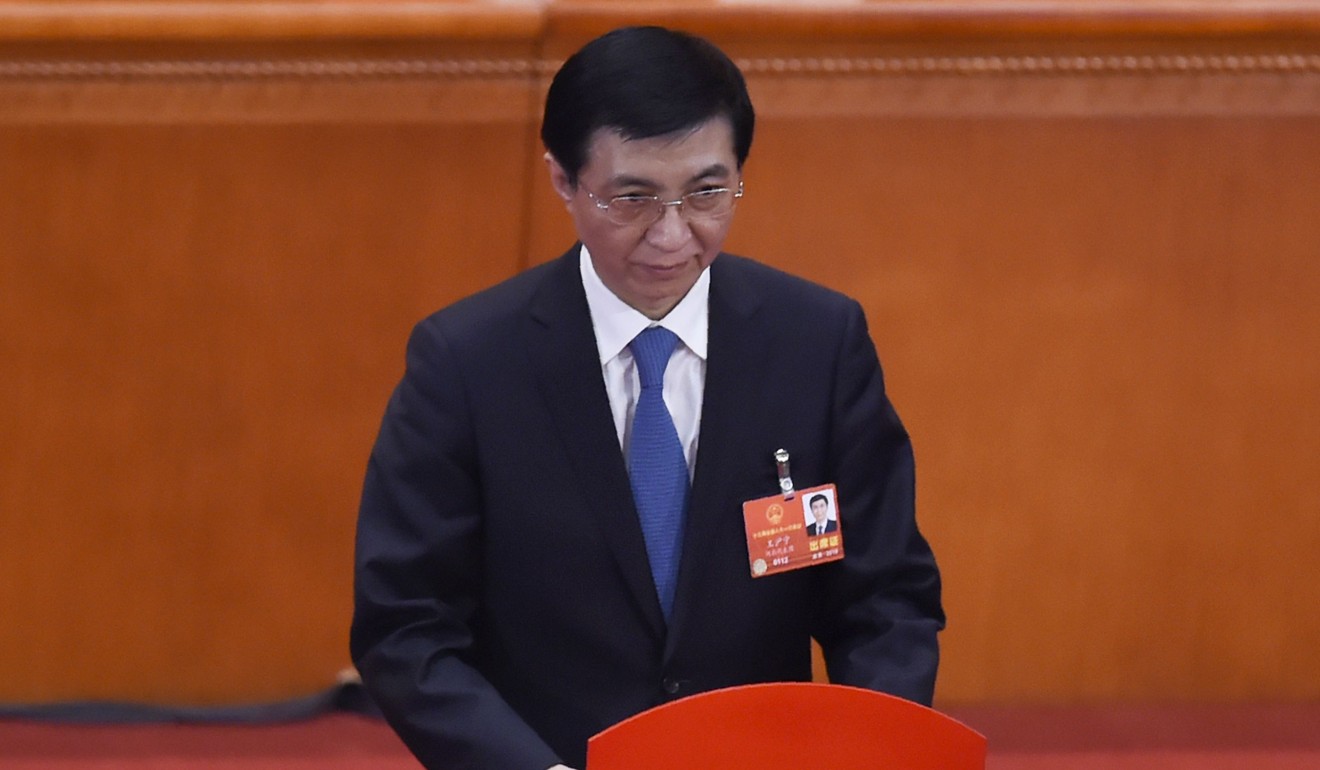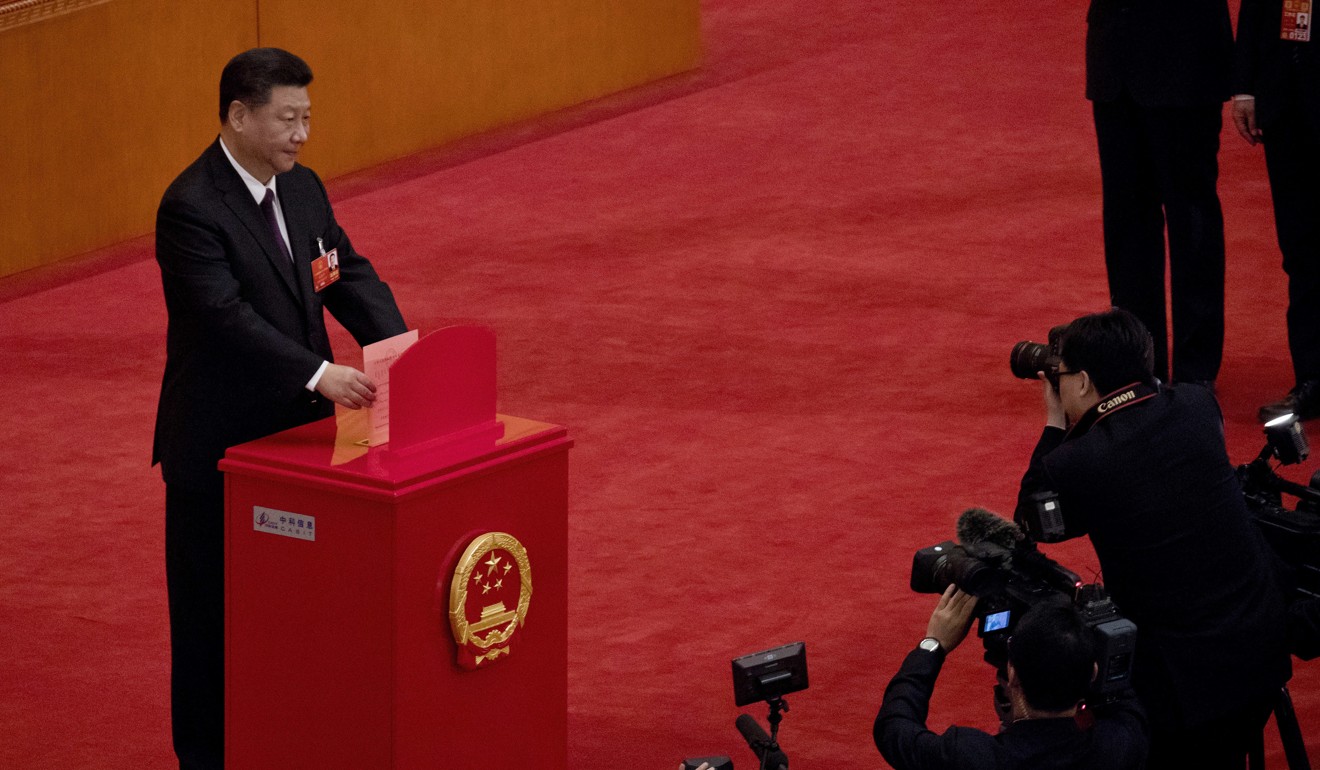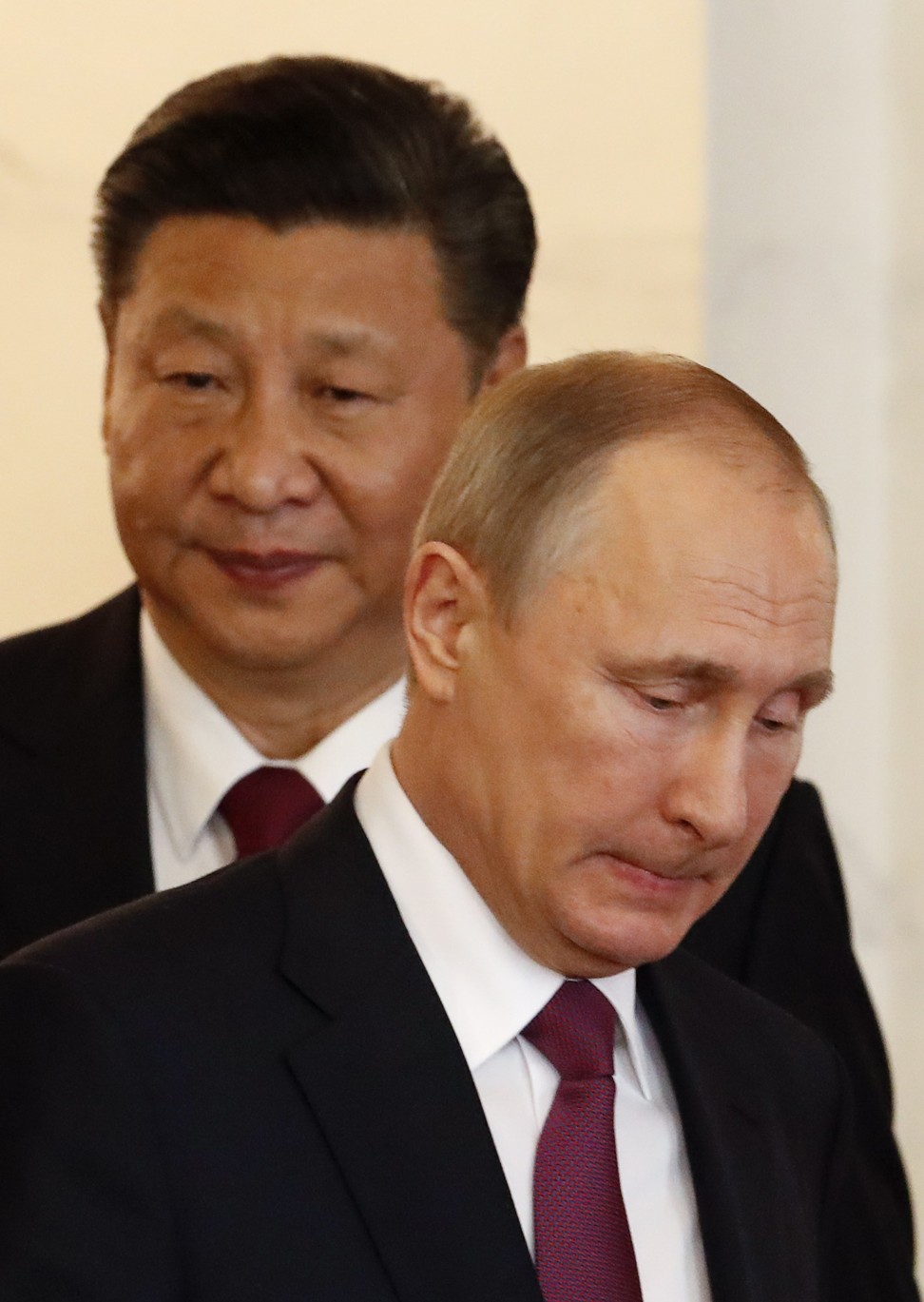
China’s Xi Jinping and Russia’s Vladimir Putin are putting strongman politics back on the map
Chinese lawmakers vote unanimously to keep Xi in power, while Putin looks to be a shoo-in for a fourth term
Strongman politics is back. And for anyone who thought otherwise, a quick peruse of this weekend’s headlines should help set them straight.
On Saturday in Beijing, Chinese President Xi Jinping received a thunderous ovation at the Great Hall of the People as he was sworn in for a second term, just minutes after receiving a unanimous mandate to do so and less than a week after lawmakers voted to revise the constitution and remove the two-term limit.
On Sunday in Moscow, Vladimir Putin will seek to become Russian president for the fourth time, and an emphatic victory looks on the cards.
While the proceedings in China and Russia might not pass muster by Western definitions of free elections, the liberal euphoria that swept across the world following the collapse of the Soviet Union is now well and truly in retreat. History did not end as Francis Fukuyama predicted. Neo-authoritarianism is on the march once more.
Ironically, it was the collapse of the Soviet Union almost 30 years ago that provided the impetus for the resurgence of the strongman leader.
Putin has made it clear what he thinks. “Anyone who does not regret the collapse of the Soviet Union has no heart. And anyone who wants to see it recreated in its former-shape has no brain”, goes his favourite saying.
For him, the break-up of the Soviet Union was an unparalleled catastrophe: Russia lost a third of its land and half of its population. Its once powerful military was left to rot and its economy was carved up and monopolised by a handful of oligarchs. Its international standing was in a free fall, and by the end of Boris Yeltsin’s presidency in 1999, few in the West were taking Russia seriously any more.
In a Levada Centre poll in 2001, 74 per cent of Russians said they regretted the collapse of the Soviet Union. But with a promise to make Russia great again – combined with his ruthless, some say murderous, political plays – former KGB man Putin began his two-decade reign in the Kremlin.
Perhaps nowhere other than in China was the collapse of the Soviet Union so studiously examined and discussed by the political elite.
In January 2013, soon after Xi took over as Communist Party general secretary, he convened a meeting with his top leaders to discuss why the Soviet Union had collapsed.
“A key reason,” he told the assembled group, “is because they lost the ideological battle. They completely rejected the history of the Soviet Union and rejected Lenin and Stalin. Once they lost the ideological unity, the party organisations stopped functioning and the military stopped listening to the party,” he said.
On Monday, Qiushi Journal – the flagship theory magazine of China’s Communist Party – republished an article citing Xi’s 2013 speech and expanded on the lessons to be learned from the dissolution of Soviet Union.
Unlike Putin, Xi inherited a well-institutionalised party with a monopoly over the country’s social, political and military resources. Hence, the rise of neo-authoritarianism is attributable not only to one man, but rather reflects the thinking of the entire party.
As the party’s ideology mastermind, Wang Huning is perhaps also its best spokesman. A scholar who is clearly ill at ease in the public spotlight, he is now China’s fifth most powerful man, following his elevation to the all-powerful Politburo Standing Committee in October.
The 61-year-old is also one of only a handful of cadres to have served under three party chiefs – Jiang Zemin, Hu Jintao and Xi.
A former Shanghai-based international relations expert, Wang has been preaching neo-authoritarianism since the 1980s, even at the peak of China’s liberalism that culminated with the pro-democracy demonstrations in 1989.

In an article published in 1988, he listed the capability to assert universal command over the whole of society as the most important tool for a government to implement the “authentic distribution of social resources”.
“An interesting pattern is … the countries and regions that are more developed usually have high political efficiency. In other words, most of them prevailed under a centralised political leadership,” Wang wrote in a journal affiliated with his alma mater Fudan University after studying the economic miracles of South Korea, Taiwan and Hong Kong in the 1980s.
He also wrote that government efficiency and democratic decision making were to some extent contradictory.
Wang believed that China should base its development on its own history, culture and on-the-ground reality. He concluded that a liberal, Western system would be disastrous and that only a strong and centralised party leadership could protect the country from endless internal conflicts and focus its resources on development.
Over the years, this thinking has gone through various modifications but its general direction remains unchanged. After the crackdown of the pro-democracy protests in 1989, liberals in the party were marginalised. At the same time, hard core Maoists lost their influence after decades of open-door policies and economic reform. Neo-authoritarianism, coupled with a rising nationalistic sentiment, became the dominating force in party talks.
Li Shuzhong, a policy adviser on the constitutional amendments and vice-president of China University of Political Science and Law, said the concentration of power would help in the enforcement of policies.
“It’s a bit in the vein of the neo-authoritarianism talked about before,” he said in reference to the decision to scrap the presidential term limits. “It’s aimed at enforcing order by asserting the authority of the central leadership,” he said.
“The faith of President Xi and the party to implement its reform and opening up policy is very firm … the route and the goal are both correct.”
The change to the constitution was passed in a vote by the National People’s Congress on March 11 that saw just two objections and three abstentions.
As well as removing the presidential term limit, the vote enshrined the leadership of the Communist Party in the charter and, by extension, made it unconstitutional to challenge the one-party rule.
Li said that the changes reflected the party’s belief that the major challenges China faced, including corruption and the stagnation of reform efforts, were the result of a lack of strong party leadership.
A similar view was voiced by Liu He, a Harvard-trained economist and one of Xi’s top advisers on economic policy since 2012.
“Lots of major flaws in China since 1949 were due to the lack of a concentrated and authentic leadership,” a source quoted the Politburo member as saying at a panel discussion to discuss the charter amendments last week.
David Shambaugh, a China expert at George Washington University in the US, said China was ruled by a strongman and a network of highly centralised institutions.
“This is now a massively powerful party state, answering to Xi, that will direct everything … In terms of policy orientation, it remains what I described as ‘hard authoritarianism’ … we can see now the system leaning toward ‘neo-totalitarianism,” he said.
Shambaugh described the party’s current path as even more authoritarian than the one promoted three decades ago.
“The kind of party state China has now … is a far cry from the neo-authoritarian model that Wang Huning, Yan Jiaqi, Su Shaozhi and Zhao Ziyang advocated back in the 1980s,” he said.
“Since 2009, Wang has very much sided with Xi Jinping’s vision of an all-powerful party state. But, in one way, Wang’s thinking has remained consistent – he has always been extremely dismissive of pluralistic and democratic systems.”
From a behind-the-scenes think tank to the fifth most powerful party official, Wang’s elevation was not conventional. His promotion, ahead of hundreds of ministerial level cadres, came despite him having no experience of governing a province or running a major party organ.
His rise is, however, indicative of the importance Xi attaches to winning the ideological battle. In the leader’s belief, without a unified mind, sooner or later the party will go down the same path as the Soviet Union.
Despite Xi’s apparent certainty, the judges are still out on whether neo-authoritarianism is the best solution for China. Several Western commentators, including Shambaugh, have questioned its validity.
“Authoritarian leaders definitely helped Taiwan, South Korea, and many Southeast Asian and Latin American countries to facilitate their economic take-offs. But China is now long past the take-off point,” he said.
China was facing the “middle income trap” stage of newly industrialised economies, and to escape it meant remaining open to democracy, he said.
“The correlation [so far] is 100 per cent: democratise to some extent or you don’t become a developed economy. China, under Xi Jinping, is the ultimate test case challenging this empirical historical record.”

On the streets of China, opinion is similarly divided.
Shu Jie, a Beijing-based lawyer, said he supported the removal of the presidential term limit, but sensed “very few” around him held the same opinion.
In January, even before Beijing made the announcement, Shu said on Weibo, China’s version of Twitter, that the term limit should be abolished.
“As a major power that has lost its dignity since 1840, this is its only chance,” the 55-year-old said, referring to China’s humiliating defeat in the Opium War. “China’s world status belongs to all the Chinese people. It can’t be given up, regardless of the costs.”
Shu, who was 13 when Mao Zedong died, said the mistakes of that all-powerful leader were unlikely to be repeated. “I don’t think disastrous decisions are likely. They are only possible in North Korea,” he said. “Now Western countries are all busy with their own problems … we should go as fast as possible now and clean our house later.”
A Shanghai woman in her 50s, who asked not to be named, said it would be good for policy consistency if Xi stayed in power beyond 2023.
“So far Xi has done pretty well and many of his ideas have benefited ordinary people, such as poverty relief and fighting corruption,” she said. “I hope these policies remain in effect for more time.”
The country’s liberal intellectuals, however, remain unconvinced. They include Li Datong, a former editor of the state-run China Youth Daily, who in an open letter published before the National People’s Congress got under way called for the nation’s lawmakers to vote against the proposal to lift the presidential term limit.
Despite the bill passing almost unchallenged, Li said he doubted the result was a true reflection of public opinion.
“They [legislators] knew nothing about it until right before they voted on it. I don’t think they can represent the people,” he said. “I talked to over a hundred of my friends – all of them intellectuals, university professors, businessmen, retired officials and journalists – and they were all against it.”
Li also dismissed the notion that Beijing needed extra authority to push through its reforms.
“I don’t see any obstacle to the reforms if they genuinely want them to go through,” he said.
Additional reporting by Alice Yan



